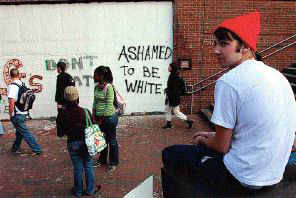People don’t understand my interest in and stance on race issues (I’m white, by the way). They tell me that it’s the 21st century, that the 1960s were a long time ago. They tell me race isn’t as much of an issue anymore. When Obama was elected, I wanted to talk about the significance of his racial background but was told by several people that it didn’t matter that he was black. True, his ethnicity has nothing to do with how well he’ll lead the country, but I couldn’t help but notice that everyone who said this to me was white. My black friends knew it mattered that they had a black president.
You can tell me that race isn’t an issue, even that Obama’s victory ushered in a new era in race relations, but I won’t believe you. After the election, students at N.C. State wrote graffiti on a wall on campus with such hateful messages as “Hang Obama by a noose” and “Shoot that n----- in the head.” And this at a respected institution of higher learning. What were you saying about race not being an issue anymore?
Now it’s time to relate all of this to Christianity. What is the Church supposed to do about the lingering racism that festers in our nation? One student’s response to the graffiti at NSCU offered a partial answer: when the wall had been whitewashed, he wrote, “Ashamed to be white.” Malcolm X and Carmichael both believed that whites admitting the sin of racism was the first step to the emancipation of blacks—and, as Cone would add, the emancipation of whites, for “the man who enslaves another enslaves himself.” Most churches confess corporate sin on at least a weekly basis. How do we confess the inherited sin of racism?
One answer comes from Malcolm Boyd in his book Are You Running With Me, Jesus? “During a Freedom Ride in the Deep South in 1961, one of my fellow Episcopalian priests said: ‘It seems to me this is really a kind of prayer—a kind of corporate confession of sin.’” This aligns with James H. Cone’s insistence that Christ’s very being is tied up with his identification with the oppressed peoples of the world—and that the Church must enter into a radical identification with that oppressed Christ and our neighbors with whom he shares his person.
The first step towards reconciliation is confession. The off-Broadway hit Avenue Q, although crass at times (or half the time) makes a good point in its song “Everyone’s a Little Bit Racist.” If we insist that race is not an issue, we only prop up old systems of injustice. The Church must help confront Americans with the sin of racism. And the Church must provide a model for radical identification with the oppressed. To do otherwise is to deny Christ.


2 comments:
Thanks Sarah for your honesty and struggle. I too find myself with some of the same struggles, in the sense that racism is still alive and "well" in the world. I think its become certainly more subtle and easily tagged as "oh she/he didn't mean anything by it"... etc.
Keep asking the questions! Keep pushing the issue! Keep being a white ally.
So, oddly - I'm old enough to remember the original Real World. And, was really psyched about it back in the day - because I thought it would be a chance to figure out what grownups were like. And, I clearly remember the episode when a girl named "Julie" cried because she was ashamed to be white.
I hate racism, but I love Dave Chappelle. Do the to have to be at odds? I don't know the answer.
Post a Comment